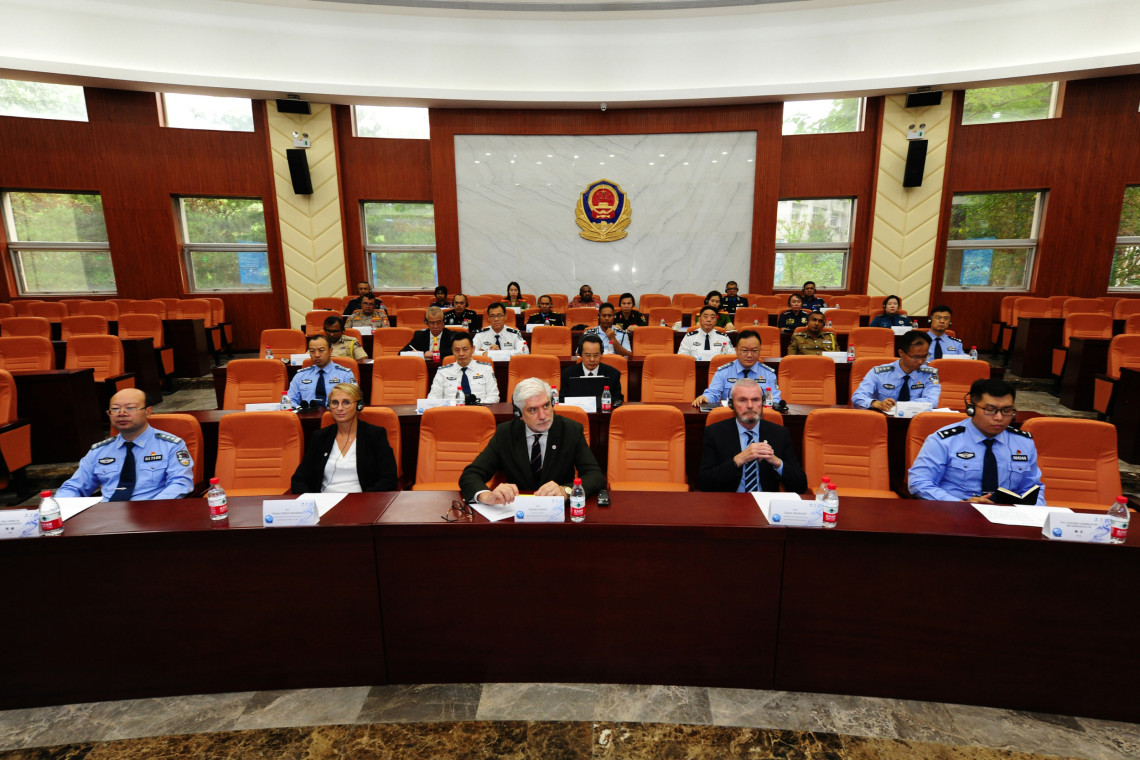
The Third Asia-Pacific Police Colloquium: Strengthening Cooperation to Promote Peacekeeping Capacity Building

In his opening speech, Thierry Meyrat, Personal Envoy of the ICRC President to China and Head of the ICRC Regional Delegation for East Asia, highlighted the close collaboration dating back to 2006 between the ICRC and the Ministry of Public Security (MPS) of the People's Republic of China, China People's Police University (CPPU), and the CPPTC. The event was seen as an important achievement of this enduring partnership, showcasing the outcomes and depth of the collaboration.
Mr. Meyrat stated that, "The aim of ICRC working with police experts is to support the latter in ensuring the implementation of international law enforcement standards and in consolidating tools to prevent violations and protect civilians. "

Thierry Meyrat (left), Head of ICRC Regional Delegation for East Asia, talks with Ma Jinqi, President of CPPU. PHOTO: CPPTC
Ma Jinqi, President of CPPU, emphasized that the university had been actively involved in training peacekeeping police since 1999 and stands as one of the few esteemed higher education institutions worldwide dedicated to nurturing high-level peacekeeping professionals.
President Ma Jinqi underscored that the theme of this conference is in line with the development needs of UN peacekeeping operations, and it embodies one of the hotspot issues and challenges inherent in peacekeeping efforts. "I genuinely hope that all participants will be able to fully articulate their insights, fostering consensus and exploring the most effective approaches and initiatives to bolster peacekeeping capacity building," said Mr. Ma.

Participants of the third Asia-Pacific Police Colloquium. PHOTO: CPPTC
During the event, participants shared innovative theories and concrete achievements on practical issues arising from the field of peacekeeping police and local police capacity building. They discussed methods and specific measures to improve capacity building, as well as core principles and procedures regarding the use of force by law enforcement officials and community policing. The participants also elaborated case studies, presented their own mission experiences and conducted in-depth discussions on specific issues such as international standards of policing and sexual violence prevention and response.
Acknowledging the efforts in organizing the police colloquium, Liu Yixiang, Vice President of CPPU, commended the ICRC for contributing in humanitarian dissemination and sharing its multi-faceted global experience in the event. He emphasized, "The world today is not at peace. We expect the UN and the ICRC to play a more active and effective role in maintaining world peace and promoting peaceful development. We also hope that police colleagues from various countries will assume greater responsibilities, make arduous efforts, and contribute more significantly!"

Boris Kelecevic, Deputy Head of the ICRC Regional Delegation for East Asia, at the closing ceremony of the event. PHOTO: CPPTC
In his concluding statements, Boris Kelecevic, Deputy Head of the ICRC Regional Delegation for East Asia, underlined the importance of showcasing the complementarity between UN Missions, the role of the police, as well as the work carried out by the ICRC within the same geographical space. Mr. Kelecevic remarked, "Despite the differences in approach and access, ... we are always happy to provide pre-deployment training or sensitization to future UN peacekeepers — or to discuss challenges (faced by police forces) within your home countries."
The experts unanimously agreed that this event yielded substantial outcomes in terms of theoretical research and best practices. The discussions during the event offered crucial guidance and laid a practical groundwork for bolstering the comprehensive skills and collaborative capabilities of peacekeeping police and local police. Moreover, the conference presented a favorable opportunity for bilateral and multilateral police cooperation. The participants expressed their confidence in jointly advancing peacekeeping police efforts and looked forward to further strengthening future cooperation and exchanges in this field.
